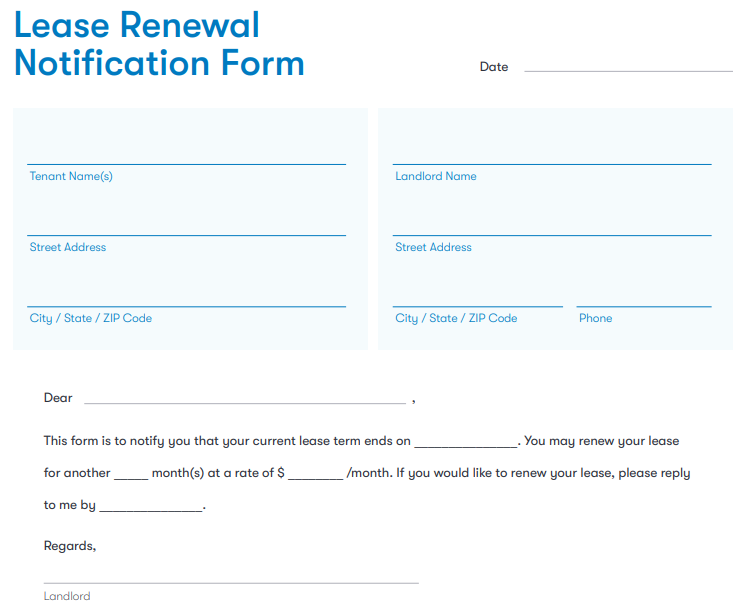Renewing a Lease With Your Tenant

July 16, 2021
8 min read
In this article:
- How to renew a lease?
- When should you send a lease renewal letter?
- How to write a lease renewal letter?
- Why is it beneficial to renew a lease?
- How to keep your current tenants
- Does a landlord have to renew a lease?
- What if your tenant wants to negotiate the lease renewal terms?
If you have a reliable tenant and want to continue renting to them, consider renewing their lease to avoid the stress that comes with finding a new tenant.
Renewing a lease generally means signing your existing tenant to a new lease with terms that are the same as or similar to their current lease. Sometimes a lease renewal is an extension of the current lease. With Zillow Rental Manager, you can easily create a lease online, review and sign it with your tenant.
Note: This guide is for informational purposes only. Zillow, Inc. does not make any guarantees about the sufficiency of the information in or linked to from this guide, or that it’s compliant with current, applicable or local laws. Landlord-tenant laws change rapidly and may be regulated at the federal, state and local levels. This resource is not a substitute for the advice or service of an attorney; you should not rely on this resource for any purpose without consulting with a licensed attorney in your jurisdiction.
How to renew a lease?
Sending a lease renewal letter is a good way to let your tenant know that you would like to continue renting to them. A lease renewal letter, sometimes called a lease renewal agreement, will notify your tenant that their lease is expiring soon and help you gauge their interest in continuing to rent your property. It's a good practice to mention whether you're keeping the same terms or making adjustments to the lease.
When should you send a lease renewal letter?
The minimum notice required to renew a lease will vary by local laws. Generally, a lease renewal letter should be sent to a tenant at least 90 days before the lease expires so they have ample time to make their decision — however, we found that 52% of renters know for less than three months that they will need to find a new place. By providing the lease renewal letter at least 90 days before the lease expires, you'll ensure that there's plenty of time for your tenant to consider their lease renewal and figure out other options if necessary.
How to write a lease renewal letter?
When you're writing a lease renewal letter, you should include:
- The names and contact information for the landlord and tenant
- The address of the rental property and unit number, if applicable
- A reference to (or copy of) the original lease
- The renewal terms or any changes to the terms of the original lease
- The last month's rent prepayment or due date
- The new rent amount, if applicable
- The proposed end date
Once you've completed the lease renewal letter, you should attach a copy of it to the lease for record keeping.
Download our free landlord notice templates, including a lease renewal letter, rent increase letter and late rent notice.

Why is it beneficial to renew a lease?
Keeping a reliable tenant has many benefits. Here are four reasons to consider renewing your tenant's lease:
1. Eliminate the cost of finding a new tenant
The cost of finding a renter can be high. Depending on the type of rental, the operating expenses may run around 35% to 80% of the gross operating income (GOI). A lease renewal can help you avoid costs associated with finding a new tenant like:
- Advertising
- Cleaning after the tenant moves out
- Maintenance, like new carpet
- HOA dues, if applicable
- Tenant screening fees
With Zillow Rental Manager, you can easily market your rental — and you'll have access to free online tools for landlords like applications, screening and payments.
2. Reduce the risk of vacancy
If you don't have a renter lined up when your current tenant moves out, you risk losing rental income while your property sits vacant. On top of a loss of rental income, you'll be responsible for the basic utilities and other expenses of the vacant property.
3. Retain a reliable tenant
Searching for a new tenant and signing a new lease can be stressful. One way to minimize that stress is to keep reliable tenants around with a lease renewal. If your current tenant pays rent on time and maintains the property, then why search for a new one? Don't put yourself through the uncertainty that comes with finding a new tenant if you're already renting to someone who's reliable.
4. Save time
If your tenant plans to move out, you need plenty of time to close out the existing renter and get the property ready for the next, prepare your listing, advertise the property and screen new prospective renters.
How to keep your current tenants
According to the Zillow Group Consumer Housing Trends Report 2018, nearly half (46%) of all renters who moved within the past 12 months already have plans to move again — now or within the next year. If you've got a reliable tenant and want them to stay, here are some things you can do that may help them decide to sign a rental lease renewal:
- Help them feel connected with the neighborhood by pointing out places to eat, shop, etc.
- Make them feel welcome on the property.
- Be available and easy to contact.
- Respond to any issues or requests promptly.
- Provide as much notice as possible when you know of a change or problem that may affect them.
- Be considerate of their rental needs.
Does a landlord have to renew a lease?
In most cases, a landlord does not have to renew a lease with an existing tenant. However, recent changes to local laws have, in some cases, limited landlords’ abilities to not renew leases. If you are unsure whether you are affected, be sure to consult a local attorney. Your tenant can also choose not to sign a lease renewal letter. Depending on your location and the original lease, you will generally have 30 days before the end of the lease to notify a tenant that you will be terminating their tenancy. This can usually be done by sending the tenant a notice of termination or a non-renewal of lease letter, which confirms the lease end date and includes move-out instructions.
Common reasons for not renewing a lease
While some places don't require a reason for terminating a lease at its end date, you may be prohibited from ending a lease in retaliation against a tenant that has reported you to the local authorities or in a way that discriminates against a class of people who are protected by fair housing laws. A landlord may consider not renewing a lease if:
- The tenant has been unreliable, including frequent late rent payments.
- The tenant has caused damage to the property or made other lease violations.
- You have received frequent complaints about the tenant from neighbors or other tenants.
- There is a change in management or you plan to sell the rental property.
What if your tenant wants to negotiate the lease renewal terms?
Ultimately, it's up to you as the landlord to decide whether you want to renegotiate the lease — but if you'd like your tenant to keep renting from you, listen to their requests and consider working toward a new agreement.
Some things that may change with a lease renewal are:
- The price of the monthly rent or the security deposit (you may want to contact an attorney in this case)
- How payments are received
- The duration of the lease
- Policies or rules
- New renters insurance requirements
Just as you have the option to renegotiate the lease terms, give your tenant the chance to suggest changes of their own.
If your tenant wants to renew to a month-to-month lease
If your tenant wants to sign a month-to-month lease, make sure to agree to the terms or terminate the lease before it expires — in some states, a lease may automatically carry over to a month-to-month lease if it's not terminated. Generally, a month-to-month lease will automatically renew each month unless either you or the tenant notify the other of their intention to terminate the lease. In some places, parties are required to give 30 days prior written notice if they plan to terminate the lease. In other places, the requirement can be 90 days notice. Be sure to consult a local attorney if you are unsure.
If your tenant doesn't want to renew the lease
Tenants are typically required to notify a landlord in writing that they do not wish to renew the lease. However, in some circumstances, such as when a tenant has received military orders, or a tenant has been the victim of domestic violence, the tenant may not need to provide any advance notice. If your tenant indicates that they aren't interested in renewing, send them written confirmation of the lease end date along with move-out instructions.
If your tenant stays after the lease expires
If your tenant remains on the property after the lease expires, you have several options. If they keep paying rent — which you keep accepting — some places may consider that the same as renewing a lease. If the tenant remains on the property but refuses to pay rent or otherwise violates the terms of the lease, you may have to consider starting an eviction. In any case, if your tenant stays after the lease expires, you should speak with a local attorney and discuss your area's landlord-tenant laws to determine the best course of action.
- For more articles, tips and trends about being a landlord and managing properties, visit our Rentals Resource Center.
- For tools to manage your rental business, download our free landlord notice templates, including a lease renewal letter, rent increase letter and late rent notice.
Create or manage your listings
Post your listing quickly and easily! Your listing will appear on Zillow, Trulia and Hotpads.
Create listingCreate or manage your listings
Post your listing quickly and easily! Your listing will appear on Zillow, Turulia and Hotpads.
Legal
Create listing